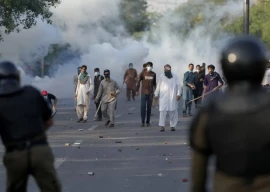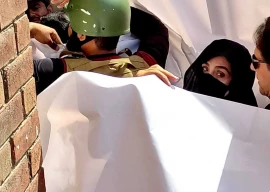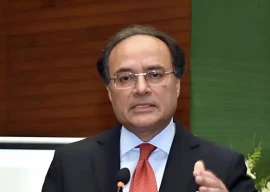The Supreme Court of Pakistan on Thursday struck down the appointment of Chairman National Accountability Bureau (NAB), Justice (retd) Syed Deedar Hussain Shah and directed him to relinquish charge immediately.
A three-member bench, headed by Justice Javed Iqbal, declared the appointment illegal in a short order issued on Thursday.
The appointment of chairman NAB had been challenged in the Supreme Court by Leader of the Opposition in the National Assembly, Chaudhary Nisar Ali Khan of the Pakistan Muslim League-Nawaz (PML-N), who contended that the mandatory requirement for consultation with the opposition for the appointment of Chairman NAB, as enshrined in the Constitution, was not fulfilled.
Maintaining that his reservations on the appointment were not taken into account, he added that he was opposed to it in view of nominee Justice (retd) Syed Deedar Hussain Shah’s past association with the Pakistan Peoples Party and the fact that he had twice served as a member of the Sindh Assembly.
The leader of the opposition claimed that he had expressed these reservations to the prime minister during a telephonic conversation.
Abdul Hafeez Pirzada, the federation’s counsel argued that the petitions were not maintainable since they were filed under Article 184 (3) of the Constitution, which relate to human rights. The apex court does not intervene except in cases where fundamental rights have been denied. The consultation process for the chairman’s appointment was carried out in accordance with the law. Earlier, the court had granted the counsel time to consult his client on the issue.
In reply to the court’s query on the consultation process and the advice given by the prime minister as mandatory under Section 6 of the National Accountability Ordinance 1999 for the appointment of the NAB chairman, Pirzada had said, “Being a law officer of the court and not the government’s counsel, I think if there are any technical deficiencies in the notification for the NAB chairman’s appointment, it can be rectified without discontinuation of the process.”
President Asif Ali Zardari had subsequently reappointed Chairman NAB on a fresh summary sent by Prime Minister Syed Yousaf Raza Gilani. The court had expressed shock over the development and asked for the latest record regarding Shah’s reappointment as NAB chief. The court had observed that NAB chief will have to step down if it is proven that the opposition leader’s views were not taken into account since his appointment would then have been in violation of the law. Justice Khosa said the earlier notification could be revoked to rectify the consultation process. However, the word ‘advice’ by the premier for the appointment was missing in the notification.
The court observed that the prime minister had stated on the record that the president is not bound to act upon his advice. Akram Sheikh, counsel for Khan, argued that the opposition leader was not consulted in accordance with section 6 of the NAB Ordinance. He added that, according to Article 48 of the Constitution, it is mandatory for the president to heed the prime minister’s advice.
Published in The Express Tribune, March 11th, 2011.
COMMENTS (52)
Comments are moderated and generally will be posted if they are on-topic and not abusive.
For more information, please see our Comments FAQ

1735196035-0/beyonce-(7)1735196035-0-165x106.webp)




1726732405-0/Express-Tribune-Web-(15)1726732405-0-270x192.webp)




1735025557-0/Untitled-(96)1735025557-0-270x192.webp)











first free media now free judiciary.what next?